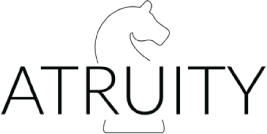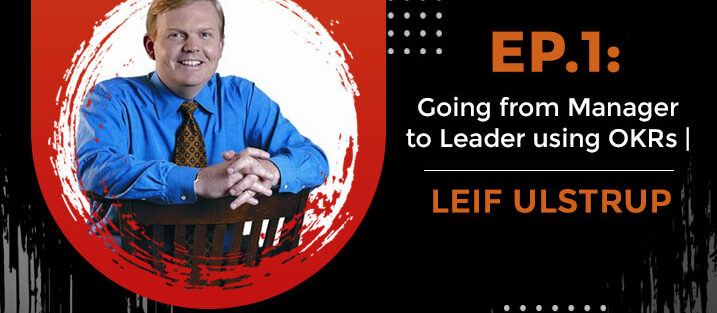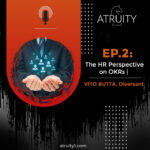In this episode of the OKRs Q&A Podcast, Tim Meinhardt interviews Leif Ulstrup about his experience with OKRs (Objectives and Key Results). Leif is an experienced senior executive and consultant with a proven track record adapting emerging technology and management innovations to achieve significant business and mission results. Leif’s experience spans from general management of very large enterprises to consulting to senior executives faced with critical business and mission transformation challenges.
Tim Meinhardt:
Welcome everyone to another exciting episode of the OKR Q&A podcast also known as the OKR Corral. I’m your host, Tim Meinhardt, CEO of Atruity, an OKR Consultancy headquartered in our nation’s capital. Today, we’re so excited to interview Leif Ulstrup. Leif is a confidante and an over 30 year senior level executive. I’ve had the pleasure of knowing Leif for almost eight years. Leif is a recognized thought leader within the Washington DC area. Please welcome Leif Ulstrup. Hey Leif.
Leif Ulstrup:
Good morning.
Tim Meinhardt:
How you doing?
Leif Ulstrup:
How are you?
Tim Meinhardt:
Good, good.
Leif Ulstrup:
I’m well.
Tim Meinhardt:
So Leif – welcome to the program.
Leif Ulstrup:
Thank you.
Tim Meinhardt:
Tell the audience a little bit about yourself and your background.
Leif Ulstrup:
So most of my background has been in general manager roles, running profit centers. I started out as a technology developer. I did develop the programs at Fortran and did work in AI with the list programming language. I started my career in technology and then I eventually got into running projects and programs and then profit centers. Then most of my career has been in running increasingly larger profit centers, in doing systems integration. I work both process and business change and also technology.
Tim Meinhardt:
Terrific. So you and I had this funny discussion about Objectives and Key Results actually through e-mail and I was so surprised that you even knew about Objectives and Key Results.So our discussions have went from there, but walk me back a little bit and talk to me a little bit about your initial impressions of this methodology called Objectives and Key Results.
Leif Ulstrup:
Yeah. So I had an opportunity to read the John Doerr, Measure What Matters book. I was traveling, I was going up to an event up at MIT and I’m sitting in for breakfast or whatever. I’m sitting reading on my Kindle and I had picked up the book. I’d seen some references to it, some reviews and I’m always looking for new innovations and management practices. It is so important that I hadn’t gotten more than maybe a quarter through the book and I thought, “Wow, this is really got some great ideas in it.” I hadn’t realized I had worked years ago with some folks from Google and they kept talking about the system that they used for their Objective setting and feedback system and it was highly transparent and everybody had things in Google sheets inside the company, and everybody could see your goals and how you’re doing on a quarterly basis.
Leif Ulstrup:
And I was intrigued with it, but I didn’t know much more about it. And then when I read the book, I sort of put two and two together. I realized, “Oh, this is the system that they were talking about.” And I thought, “Wow, this is very interesting.” So anyway, that’s what triggered my interest in it. And I thought it had a lot of valuable ideas. I’m always looking for either emerging technologies or new business practices or management and/or techniques, and so forth. Both in the work that I’ve done as a leader, but also when I’m helping advise clients.
Tim Meinhardt:
Yeah. You know, Leif, we had a very similar experience. I was turned onto the book Measure What Matters by a friend of mine. And I got a third of the way through the book and went, “Oh, this thing is really, really, really, really innovative.” And I liked the agile nature of it as well and it was just such a, to me, I found it to be an exciting book, just to learn a little bit about what it was and what people were thinking about a decade or more ago on how to be able to build a fast growth company and what the importance of goal setting was to the development and success of those organizations.
Leif Ulstrup:
Well, one of the things it goes back to are the ideas, John Doerr got the ideas from his experience at Intel, working for Andy Grove, who is somebody I really admire, but Andy Grove also got a lot of those ideas from Peter Drucker, who’s somebody who’s my management hero.
Tim Meinhardt:
Right.
Leif Ulstrup:
So yeah and it’s interesting to see how different ideas turn into these innovative approaches.
Tim Meinhardt:
Right? And you and I, in our first flurry of e-mails, you said, “You know, Tim, I’m actually have been doing a small project with Objectives and Key Results.” And walk us through a little bit about what you felt were the largest challenges in getting started for any group with objectives and key results.
Leif Ulstrup:
I think just one of the hard parts is just formulating what those Objectives should be. Once you start to write them down and you started thinking about, “Well, how do I frame them? How do I phrase them?” And when you think about how the process works, you’re going to share them with everybody. So it’s a little different when maybe you have a set of … Peter Drucker always emphasized the management by objectives, and maybe you have a one sheeter with your boss that explains what you’re doing. But now all of a sudden, no, no, this is going to be in a spreadsheet. It’s going to be a presentation that everybody can look at. Well, maybe I need to spend a lot more time. How do I want to formulate those? And if I’m at a fairly senior level, the way that I construct those is going to set it, how to construct them is going to set a tone for the entire organization.
Leif Ulstrup:
So if I am too conservative in how I frame them, or if they’re too aspirational, too objective, too abstract or whatever it might be, it can have a pretty big impact on how people perceive what is it you want to do? And I think just that can be difficult to formulate those.
Tim Meinhardt:
Yeah, it absolutely is. And it works a part of your brain that you’re not necessarily always asked to work. And so my experience has been in working with managers that at first, they’re looking for the key. Like, what’s the quick answer here. And the quick answer is it takes a little bit of time just to think it through and we work with probing questions and those are extremely difficult to ask of yourself sometimes.
Leif Ulstrup:
Yes. Oh yeah. I mean, almost impossible. I think that, that’s the power of the whole thing is the reflection aspect, both when you formulate them to begin with, but then that quarterly reflecting and learning. And I mean, it’s very powerful approach, but it does force you to spend more time reflecting that a lot of managers really don’t want to do or have time to do actually.
Tim Meinhardt:
It’s true. But yet everybody says the same thing. Jeez, I feel so much more comfortable now that I’ve talked this out. That’s exactly what I was thinking. And so, and you go, “Well, yes, it is. That’s what we’ve come up with.”
Leif Ulstrup:
That’s good.
Tim Meinhardt:
So Leif, share with us a little bit about what, and you even talked about your son doing this, but I’m interested in hearing a little bit about what you think has been your largest success story that you’d love to be able to share with the audience about Objectives and Key Results.
Leif Ulstrup:
Well, I think probably the most successful thing I’ve seen is, is clients starting to have more of a dialogue with the clients that sponsor me as an advisor to them, just engaging in a dialogue with their direct reports and their ability then to exchange more clarity about what they’re looking for and not just for the next month or the next quarter. But thinking out, “Okay, where are we going to be as a business in the next two, three, four years?” And that dialogue I think is really the key elements, all this. The mechanics of the process and in a large organization it can be a lot of work and you do help clients to figure out how to go about implementing them.
Leif Ulstrup:
But I think that the initial dialogue and exchange, it also reveals one of the things that clients have said to me, is it reveals aspirational goals of their staff that they weren’t aware of until they started having these conversations because unlike a typical goal setting, it’s more financially driven or sales driven. Well, okay, we have some number and then somebody allocates that number to you. Well, okay. I got to figure out how to close that gap, but this is a little different because you’re being asked to think about what kind of contribution can my organization make to the success of the whole. And it goes beyond just, okay, there’s the number or whatever you’re being held accountable in terms of revenue or budget or something, but gets you thinking more about what’s the nature of the group that you’re running and what are the things that you can do that have maybe meet higher level goals that have been set?
Leif Ulstrup:
I mean, the example John Doerr uses is a football team trying to get into … They want to get into the playoffs.
Tim Meinhardt:
Super Bowl.
Leif Ulstrup:
Or they want to get into the Super Bowl.
Tim Meinhardt:
Sure.
Leif Ulstrup:
Right. And if you’re in marketing, it’s one thing. If you’re selling seats or if you’re somebody who’s the offensive coach or something. They all have different roles to play and contributions to make. And I think it forces you to think about that and reflect on it in a way. That’s what I’ve heard from clients is the dialogue they’re having with their direct reports is much more meaningful dialogue. And I think there’s nothing but good that can come from that. I think we’re in such a world where people are overwhelmed with information coming at them on a day to day basis, especially in larger organizations that they don’t have the time to have those conversations, have that kind of a dialogue. And this forces it, but I think it’s constructive.
Tim Meinhardt:
Well, thank you. That was fantastic.
Leif Ulstrup:
Thank you.
Tim Meinhardt:
So let’s say that you do have this conversation with an organization and they’re considering starting Objectives and Key Results. Like tell me a little bit about what advice you might give them as they begin to look down this path of performance management.
Leif Ulstrup:
Look, probably the most important thing is, is that if they do it, they ought to start relatively sort of a small approach amongst, and it’s got start with the leader showing the way. This is not something that you, “Oh, I’m going to implement it and I’ll just have somebody over, some direct report take responsibility for it.” The leader has to be the central point of rolling this out. And so I think you have to make a commitment that you’re willing to spend the time. And then a big part of the heat of this is the quarterly time to reflect. We thought we could do X, but we only got half of X done. You got to spend some of that time, why, right?
Leif Ulstrup:
So the value of this is then looking at, we set certain Objectives and Key Results. And on the Key Results, if we’re not meeting those, this is not necessarily … Many of them are not traditional business measures that might just be sales for the month or something like that. A lot of these are things which are probably more abstract problems that you’re working on, harder problems that you’re working on.
Tim Meinhardt:
Sure.
Leif Ulstrup:
And so you have to be willing to commit the time to do the reflection, and then do the planning for the next quarter. And a lot of folks they’re intrigued with the idea but they may not be ready to devote that kind of time. And if they’re not, I think they’re probably not the right organization at that point. They’ve got to find a place, a time, and a reason that they’d be willing to do that, because this is all … I always think about this concept of working on the business and working in the business. And most people are working in the business.
Tim Meinhardt:
In the business.
Leif Ulstrup:
Making, meeting their numbers or whatever it is, running the operations, getting something processed, but that time working on the business, which is what these are all about. You have to be willing to carve out a fair amount of time. And I think that the benefits are potentially significant, but a lot of folks, if they’re not …. That I think is the key starting thing is that you’ve got to be willing to do that.
Tim Meinhardt:
Yep. I couldn’t agree with you more. All right. So kind of last question here, Leif. So what was the burning question that you had about Objectives and Key Results when you got started even learning about this and doing things with it that you’d want to be able to now be able to provide us with the answer?
Leif Ulstrup:
Well, so I don’t know if I have the answer with … But, the thing that I was curious about is who this would necessarily resonate with, what type of leader, because lots of times I have been in management and management consulting for most of my career, and there’s always some new fad. There’s some new thing that … In fact, actually one of the fads in the mid-nineties was Peter Senge’s learning organization, which is everybody was talking about, but no one knew how to implement it. And looking at these OQR’s, I realize they’re actually a good implementation of those concepts, but lots of times these ideas that come along only resonate with a portion of leaders. And I was curious about how, whether this would end up being just kind of a little fad and come and go.
Leif Ulstrup:
And who would it resonate with? And I’ve been surprised. I mean, you and I talked about this a few times ago in the last couple of years. I think this has much more staying power because I think he did a very good job, John Doerr, in his book explaining how this has powered so many iconic companies we have today, especially in the fast growing dotcom companies. And so I think that has given some credence to the value of this, that some of the other techniques didn’t necessarily have.
Leif Ulstrup:
So, I think probably the thing that I think it’s a broader base of executives are resonating with this than I realized. And I think once people start to realize that this gets them back to the basics of being a leader, as opposed to just being a manager.
Tim Meinhardt:
Correct.
Leif Ulstrup:
And I think that, that’s what I think where the power of this is, is in helping you to think about how to lead, as opposed to just … I think about managers kind of keeping things in control, right? They define a system, control it, whereas this is not a control system. Most companies have a lot of control systems. This is a leadership thing, right? It’s the working on the business. And so I think the question I had in mind, would this be broadly, or is this just like kind of one of those things?
Tim Meinhardt:
Yeah, quick fads, quick pop.
Leif Ulstrup:
Yeah. So my sense is that I think this appeals to a broader set of leaders and I’m hopeful that this will become something that was broadly adopted. And one of the previous things that I was always fascinated with a lot of like lean thinking, the Toyota production system, but a lot of that, it has resonated with some companies, but culturally, it was too hard for too many companies, even though it’s an amazing way to operate. A lot of companies have struggled with that, but this I think is applicable to a broad set of companies.
Tim Meinhardt:
Wonderful.
Leif Ulstrup:
And not just companies, I mean organizations, so even government and nonprofits could be using this. It really is applicable to any kind of lark or any kind of organization that it is trying to grow and succeed.
Tim Meinhardt:
Well Leif, thank you so much for your insight. I know I’ve sincerely appreciated every conversation that I’ve had with you, especially about the OKR’s. And again, I was so surprised when I reached out just to say that I’m doing work in this space and you said, “Hey, Tim, I’m doing a little work in it too.” It prompted some wonderful conversations. And I just want to thank you again for taking some time today to join us on our little podcast,
Leif Ulstrup:
Tim, thank you very much. Thanks for having me on the show.
Tim Meinhardt:
You’re quite welcome Leif. Listen, have a wonderful day and thanks again. See you now.
Leif Ulstrup:
Thank you, bye-bye.
Tim Meinhardt:
Bye-bye.
As a trusted OKR consultancy firm, let us transform your business plan into measurable goals with OKR. Our performance management advice on OKR implementation can help you unlock the full potential of your organization. Call us today at 240.403.4086 or fill in our contact form to send us a message.
If you have questions on OKR and are looking for a trusted partner to unlock your organization’s full growth potential, Atruity offers valuable advice on considering and implementing successful OKR programs. Call us today at 240.403.4086 to learn more about our programs, or fill in our contact forms to shoot us a message.
To listen to the podcast, click on the links below:











